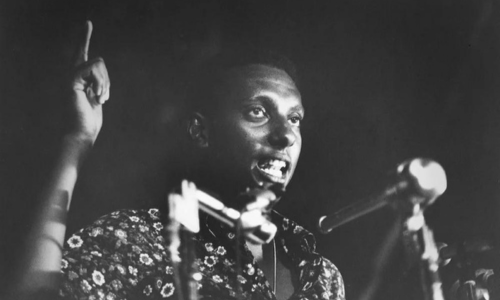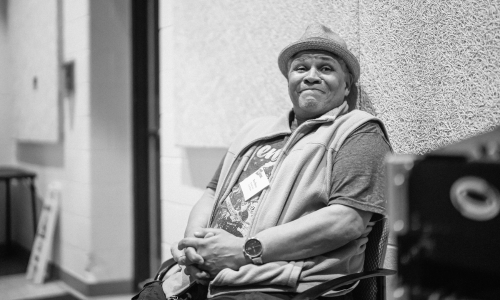In Conversation: Playwright Nambi E. Kelley and Director Tasia A. Jones

In 2018, Court Theatre and Playwright Nambi E. Kelley (Native Son) received the Prince Prize, a gift from Prince Charitable Trusts supporting the creation of new work. Now, in 2024, that original commission is fully realized and brought to life on our stage. We proudly present the world premiere of Stokely: The Unfinished Revolution.
Blending the historical and the personal with astonishing grace, Stokely depicts one man’s rise to prominence—and the many people who made it possible—as he fights to preserve his legacy to inspire future generations.
Just days into the rehearsal process, Associate Director of Marketing Camille Oswald met with Playwright Nambi E. Kelley and Director Tasia A. Jones to discuss Stokely Carmichael, new play development, and whether the unfinished revolution can ever truly be complete. Below is an excerpt from their conversation.
Let’s begin by discussing the historical figure at the root of this story: Stokely Carmichael, later known as Kwame Ture. What drew you to his narrative in the first place? What was it that made you want to learn more about Stokely, specifically?
Nambi: He was an inventor; he tried things, and if they didn’t work, he tried something else, always with the bigger picture of freedom in mind. There was no ego.
Tasia: For me, I was drawn to his beginnings; I wasn’t aware of his story until I read the play and started to do my research. I knew who he was, but I didn’t know that he was an immigrant from Trinidad. That story was very familiar to me—my family came from the islands, as well—so I immediately wanted to know more about this person. And, as Nambi said: the lack of ego. What drives a person to be so invested and so selfless for a greater cause, a greater purpose beyond themselves?
Could you describe the development process for Stokely: The Unfinished Revolution?
Nambi: Usually, when I work on something, I start with research. There’s a lot of stuff online about Stokely Carmichael—a lot of his speeches, a lot of the books that he had written—so I did a deep dive during the pandemic and then I just started writing! In those early drafts, I wrote whatever fell out of my spirit.
This play is grounded in Stokely’s memories, but I didn’t plan for it to be a memory play; I didn’t outline it like that. I just read the material—ingested, digested the material—and, eventually, it took that shape. Maybe it happened that way for personal reasons: I’ve lost both my parents, so I think about ancestors a lot. I think about what drives me, what gets me out of bed, and the things that drove them. Maybe, in that way, this production is paying homage to my people.
Thanks to the Prince Prize, this commission was guaranteed to be staged and produced, so the next step in the process was finding a director. We knew we wanted them to be a part of the development process, and then we found Tasia, who was a perfect fit. From that point on, it was workshops, readings, more workshops, casting. Even now, a couple of days into rehearsal, we’re still developing; I sent eight new pages today.
Tasia: It’s constantly evolving. As Nambi said, during these first few days of rehearsal, we’re constantly asking questions. A new play is always in process, but I really think every play is always in process, even once it’s published and done. Every time new people get their hands on it, it becomes a new thing. We’re really excited to take part in the evolution of this story, with these people, in this space.
Thinking about evolution, let’s talk about Stokely Carmichael’s transformation. As he became more influential, he became a target of the FBI’s COINTELPRO program, which targeted other civil rights leaders like Dr. Martin Luther King, Jr. Carmichael then left the United States for Ghana (and later, Guinea); changed his name to Kwame Ture; and became a vocal proponent of Pan-Africanism.
Even though these names—Stokely Carmichael and Kwame Ture—belong to the same individual, they represent major personal and political shifts. What’s the relationship between Stokely Carmichael, the man, and Kwame Ture, the legend?

Tasia: That’s the central question of the play: we have Stokely Carmichael, and we also have Kwame Ture. There’s a reason that this man changed his name and moved his whole life to Guinea, and there’s so much to investigate about why that happened. We have his book, Ready for Revolution; we have a lot on paper that we can look to; we have accounts from his friends and family. We have all of this, but we still have the question of, What makes a person? What does it mean to build your legacy, and to consciously try to leave one?
Nambi: Which is why the play is so personal, so focused on his memories. Much of the history will be familiar to people, but it’s still deeply personal in terms of how he experienced those moments. I’ve done my best to present Stokely, so the story is also told through my lens. As someone who witnessed 9/11; who watched the Gulf Wars; who sees what’s happening in Gaza; sees what’s happening to Black people on the South Side of Chicago, on the West Side of Chicago; who sees the struggles that are still here to this day—maybe all of that makes this play a conversation.
The title asserts that the revolution is not yet complete. What does that mean to you?
Nambi: I don’t know that the revolution will ever end, but I know that with each step you take, you run your race. You grab the baton, you run as hard as you can, and you pass it back to whoever’s behind you, knowing that—trusting that—the work will get done. [To Tasia] You have a young child and I have a niece and nephew, who I love more than life. What world are they inheriting? So you keep running, because the people behind you deserve it, they need it. That’s why we’re here. Unfortunately, particularly for Black folks, we always have to think about who’s coming behind us and who came before us. The burden of liberation is on every generation. Toni Morrison asks, “Who would you be without [racism]?” And we don’t know. I dream of that, and I try to live my life in a way that feels free, but then microagressions let you know that this isn’t over. So you do your best, you run your race, and you trust. Faith is all it is. The ancestors believed in us, they dreamed us, so who are we dreaming? And what world are we leaving to them?
Tasia: Yes, all of that. I couldn’t think about that and still have a child, and take them out into the world because it’s ever-present. Do I think the unfinished revolution will ever be finished? I don’t know what that would look like; I don’t even know how to imagine that, actually—what that would feel like— because that’s not our reality. But I do know that we do keep running. I do know that we have made progress. There’s a reason that we’re able to have this conversation right now, and that’s because of those who came before us and the race they ran.

Nambi: And that’s even as recent as somebody like Ron OJ Parson, who broke huge ceilings here at Court. Not too long ago, Court wasn’t doing any plays by people of color and Ron has revolutionized this space. So revolution happens just by showing up. If he hadn’t done that work, I wouldn’t be here.
Tasia: Right. There are smaller revolutions happening all the time that are completed. I take solace in that. If I can complete my part of the revolution in the race I’m running—as Kwame Ture strives to do in this play—then I feel like I can pass that baton and feel like I’ve done my part, knowing that the work continues.
Nambi: Why did you say yes to directing this play?
Tasia: My personal mission—as a theatre artist and as a human being—is to tell stories that invite or incite change, and this story does that. It spoke to my personal mission, and I feel like I have something to contribute. What about you?
Nambi: What made me say yes to this commission? It’s simple. My daddy, Dr. Don Kelley, was a historian. As a child of a historian, I have been steeped in history and our leaders for my entire life. My daddy gave me heroes when I was a young girl. Stokely was one of them.
Stokely: The Unfinished Revolution runs May 24 – June 16. Tickets are available online or by calling the Box Office at (773) 753-4472.